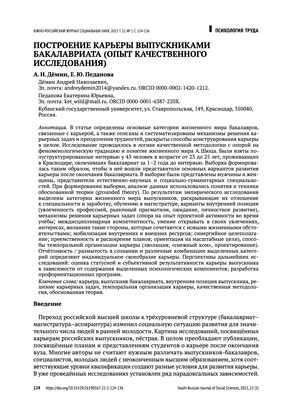Аннотация
В статье определены основные категории жизненного мира бакалавров, связанные с карьерой, а также описаны и систематизированы механизмы решения карьерных задач и преодоления трудностей, раскрыты способы конструирования карьеры в целом. Исследование проводилось в логике качественной методологии с опорой на феноменологическую традицию и понятие жизненного мира А. Шюца. Были взяты полуструктурированные интервью у 43 человек в возрасте от 23 до 25 лет, проживающих в Краснодаре, окончивших бакалавриат за 1–2 года до интервью. Выборка формировалась таким образом, чтобы в неё вошли представители основных вариантов развития карьеры после окончания бакалавриата. В выборке были представлены мужчины и женщины, представители естественно-научных и социально-гуманитарных специальностей. При формировании выборки, анализе данных использовались понятия и техники обоснованной теории (grounded theory). По результатам эмпирического исследования выделены категории жизненного мира выпускников, раскрывающие их отношение к специальности и заработку, обучению в магистратуре, варианты внутренней позиции (увлеченность профессией, рыночный прагматизм, ожидание, личностное развитие), механизмы решения карьерных задач (опора на опыт проектной активности во время учёбы; междисциплинарная компетентность, умение открывать в своих увлечениях, интересах, желаниях такие стороны, которые сочетаются с новыми жизненными обстоятельствами; мобилизация внутренних и внешних ресурсов; синергийное целеполагание; преемственность и расширение планов; ориентация на масштабные цели), способы темпоральной организации карьеры (эволюция, «снежный ком», проектирование). Отчётливость / размытость в сознании и различные комбинации выделенных категорий определяют индивидуальное своеобразие карьеры. Перспективы дальнейших исследований: оценка статусной и субъективной результативности карьеры выпускника в зависимости от содержания выделенных психологических компонентов; разработка профориентационных программ.
Ключевые слова
Библиографические ссылки
Akkermans, J., Kubasch, S. (2017). #Trending Topics in Careers: A Review and Future Research Agenda. Career Development International, 22(6), 586–627. DOI: doi.org/10.1108/CDI-08–2017–0143.
Beck, U. (2000). Obshchestvo riska. Na puti k drugomu modernu [Risk Society: Towards a New Modernity]. Moscow: Progress-Tradicziya.
Demin, A. N., Sedykh, A. B. (2014). Psikhologicheskiye kharakteristiki karyer molodezhi v pervyy god posle okonchaniya bakalavriata [Psychological Characteristics of Young People’s Careers in the First Year after Graduation from the Bachelor’s Degree]. Chelovek. Soobshchestvo. Upravlenie [Human. Community. Management], 4, 118–131.
Diomin, A. N., Popova, I. P. (2000). Sposoby adaptatsii bezrabotnykh v trudnoy zhiznennoy situatsii [Unemployed’ Tactics In The Adaptation To Hardships Of Life]. Sotsiologicheskiye issledovaniya [Sociological Studies], 5, 35–46.
Efendiev, A. G., Balabanova, E. S. (2010). Professionalnaya karyera vypusknikov fakulteta menedzhmenta [Professional Career of Graduates of the Faculty of Management]. Sotsiologicheskie issledovaniya [Sociological Studies], 2, 100–110.
Erikson, E. (1996). Identichnost’: junost’ i krizis [Identity: Youth and Crisis]. Moskva: Izd. gruppa “Progress”.
Ermolaeva, M. V., Lubovskii, D. V. (2015). Osobennosti vnutrenney pozitsii studentov-psikhologov [Characteristics of The Inner Attitude of Students of the Psychological Faculty]. Voprosy psikhologii [Voprosy psikhologii], 3, 58–65.
Holland, J. L., Johnston, J. A., Asama, N. F. (1993). The Vocational Identity Scale: A Diagnostic and Treatment Tool. Journal of Career Assessment, 1(1), 1–11.
Khoroshilov, D. A., Mel’nikova, O. T. (2018). Kachestvennyy analiz v psikhologii — nauka ili iskusstvo? [Qualitative Analysis in Psychology: Science or Art]. Voprosy psikhologii [Voprosy psikhologii], 2, 1–10.
Marcia, J. E. (1996). The Importance of Conflict for Adolescent and Lifespan Development. In Leni Verhofstadt-Deneve et al. (Eds) Conflict and development in adolescence (pp. 13–19). Leiden University: DSWO Press.
Osipow, S. H. (1989). Career Issues through the Life Span. In M. S. Pallak, R. Perloff (Eds) Psychology and work: Productivity, Change, and Employment (pp. 141–168). Washington: APA.
Schutz, A. (2004). Izbrannoe: Mir, svetyashchiisya smyslom [Favorites: A World that Glows with Meaning]. Moskva: “Rossiiskaya politicheskaya entsiklopediya” (ROSSPEN).
Smale, A., Bagdadli, S., Cotton, R., Dello Russo, S. et al. (2019). Proactive Career Behaviors and Subjective Career Success: The moderating role of national culture. Journal of Organizational Behavior, 40(1), 105–122. DOI: doi.org/10.1002/job.2316.
Standing, G. (2014). Prekariat: novyi opasnyi klass [The Precariat: The New Dangerous Class]. Moskva: Ad Marginem Press.
Strauss, A., Corbin, J. (2001). Osnovy kachestvennogo issledovaniya: obosnovannaya teoriya, protsedury i tekhniki [Basics of Qualitative Research: Techniques and Procedures for Developing Grounded Theory]. Moskva: Editorial URSS.
Super, D. E. (1990). A Life-Span, Life-Space Approach to Career Development. In D. Brown, L. Brooks (Eds) Career Choice and Development (pp. 167–261). San Francisco: Jossey-Bass.
Tikhomirov, O. K. (1984). Psikhologiya myshleniya [Psychology of Thinking]. Moskva: Izd-vo Mosk. un-ta.
Tolochek, V. A. (2017). Professional’naya kar’era kak sotsial’no-psikhologicheskii fenomen [Professional Career as a Socio-Psychological Phenomenon]. Moskva: Izd-vo “Institut psikhologii RAN”.
Tomlinson, M. (2012). Graduate Employability: A Review of Conceptual and Empirical Themes. Higher Education Policy, 25, 407–431. DOI: doi.org/10.1057/hep.2011.26.
Ulanovskiy, A. M. (2006). Kachestvennaya metodologiya i konstruktivistskaya oriyentatsiya v psikhologii [Qualitative Methodology and Constructivist Orientation in Psychology]. Voprosy psikhologii [Voprosy psikhologii], 3, 27–37.
Webley, P., Nyhus, E. K. (2008). Inter-Temporal Choice and Self-Control: Saving and borrowing. In A. Lewis (Ed.) The Cambridge Handbook of Psychology and Economic Behavior. Cambridge, UK: Cambridge University Press.


